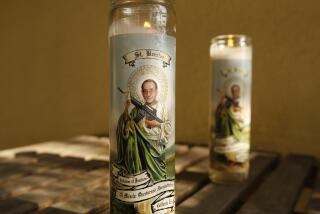Noriega Trial Judge Called Evenhanded Jurist : Law: Despite recent heart surgery, William M. Hoeveler says he feels an ‘obligation’ to finish the case. Lawyers praise his demeanor.
- Share via
MIAMI — Peering down at defense lawyers and prosecutors who were squabbling over a legal issue in the trial of deposed Panamanian leader Manuel A. Noriega, the judge acknowledged that he was mildly exasperated.
“Gentlemen, sometimes I feel like I’m on a family vacation,” U.S. District Judge William M. Hoeveler said with a smile.
Hoeveler has good reason to keep the courtroom calm and orderly--he is recuperating from emergency open-heart surgery on Dec. 24 that caused a seven-week recess in Noriega’s trial on drug-smuggling and racketeering charges. Doctors have advised the judge to avoid becoming overly excited, which would seem contradictory to his nature anyway.
The 69-year-old Hoeveler does not drink or smoke, and aides say he is the last person anyone would expect to have a heart problem. The reed-thin, 6-foot-4 jurist, who played basketball at Temple and Bucknell universities in the 1940s, has played tennis all of his life and still takes long walks.
“I feel I have an obligation to finish this case,” he said when asked recently why he had not stepped aside from the long-running case following the surgery.
“As long as it doesn’t injure my health--and the doctor says it won’t--I feel I owe it to the defendant and the government.”
But throughout the often contentious proceedings that began last September, Hoeveler has been forced to deal with a series of nagging issues that threatened to derail the entire process before the trial even began.
Noriega’s principal defense attorney, Frank A. Rubino, challenged the government’s right to put his client on trial, claiming that U.S. Army troops illegally seized Noriega outside U.S. jurisdiction after the invasion of Panama in December, 1989.
Since his arrest, Noriega has been held in detention at a federal facility in Miami. He faces up to 140 years in prison if convicted of all 10 racketeering, conspiracy and drug-smuggling counts against him.
In a lengthy written opinion following several weeks of hearings, Hoeveler rejected Rubino’s claim that Noriega’s arrest was illegal.
At one point, the judge told lawyers assembled before him: “I was going to ask Mr. Rubino a question, but he seems to have escaped my jurisdiction temporarily.” Even Rubino joined in the laughter at the tongue-in-cheek comment.
And when Cable News Network obtained tapes containing some of Noriega’s prison telephone conversations with his lawyers, Hoeveler prohibited the network from further broadcasting them after brief excerpts already had been aired.
After an appellate court and the U.S. Supreme Court upheld his ruling, the judge subsequently determined that the taped conversations were harmless, and the issue faded away.
Hoeveler, who earned his law degree at Harvard University, was appointed to the bench in 1977 by then-President Jimmy Carter. He has since received consistently high ratings from the Florida Bar Assn.
Known for his grandfatherly demeanor and willingness to hear all sides, Hoeveler is seldom criticized by lawyers. Their only complaint seems to be that he sometimes is too patient and takes too long to reach decisions. But his fairness is never questioned.
Veteran Miami lawyer Charles Intriago calls Hoeveler “a very fair, very evenhanded judge. You can be sure Noriega will get a better measure of justice than he ever meted out himself in Panama.”
Hoeveler is also deeply religious. He holds a senior position and is a chalice bearer at St. Stephen’s Episcopal Church in his neighborhood, located not far from the downtown area. He keeps a Bible on his desk, along with a copy of the Federal Rules of Procedure.
“I think our laws are a reflection of our morality,” he said in an interview last year. “Anyone who takes the trouble to study the roots of the Declaration of Independence and the Constitution will recognize that the men who created each had a very deep faith.”
And the judge said he believes that this ideal applies to the Noriega trial.
“This case has gotten a lot of attention internationally,” Hoeveler said. “I feel it’s a test of our system. The American system of justice is on display.”
More to Read
Sign up for Essential California
The most important California stories and recommendations in your inbox every morning.
You may occasionally receive promotional content from the Los Angeles Times.













